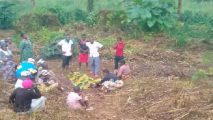Categories
Recent Posts
- Football: Panthère du Ndé Wins Cameroon Cup 2025
- Fifa brings in new £45 ticket for 2026 World Cup
- President Sisiku Ayuk Tabe, top aides to appear before the Supreme Court
- Pressure mounts on Biya as speculation grows over possible replacement of Ngute
- 2025 is the year when Biya’s long rule finally lost its last convincing justification
Archives
- December 2025
- November 2025
- October 2025
- September 2025
- August 2025
- July 2025
- June 2025
- May 2025
- April 2025
- March 2025
- February 2025
- January 2025
- December 2024
- November 2024
- October 2024
- September 2024
- August 2024
- July 2024
- June 2024
- May 2024
- April 2024
- March 2024
- February 2024
- January 2024
- December 2023
- November 2023
- October 2023
- September 2023
- August 2023
- July 2023
- June 2023
- May 2023
- April 2023
- March 2023
- February 2023
- January 2023
- December 2022
- November 2022
- October 2022
- September 2022
- August 2022
- July 2022
- June 2022
- May 2022
- April 2022
- March 2022
- February 2022
- January 2022
- December 2021
- November 2021
- October 2021
- September 2021
- August 2021
- July 2021
- June 2021
- May 2021
- April 2021
- March 2021
- February 2021
- January 2021
- December 2020
- November 2020
- October 2020
- September 2020
- August 2020
- July 2020
- June 2020
- May 2020
- April 2020
- March 2020
- February 2020
- January 2020
- December 2019
- November 2019
- October 2019
- September 2019
- August 2019
- July 2019
- June 2019
- May 2019
- April 2019
- March 2019
- February 2019
- January 2019
- December 2018
- November 2018
- October 2018
- September 2018
- August 2018
- July 2018
- June 2018
- May 2018
- April 2018
- March 2018
- February 2018
- January 2018
- December 2017
- November 2017
- October 2017
- September 2017
- August 2017
- July 2017
- June 2017
- May 2017
- April 2017
- March 2017
- February 2017
- January 2017
- December 2016
- November 2016
- October 2016
- September 2016
- August 2016
- July 2016
- June 2016
Featured
 2025 is the year when Biya’s long rule finally lost its last convincing justification
2025 is the year when Biya’s long rule finally lost its last convincing justification  Young Cameroonians: Build social capital to succeed
Young Cameroonians: Build social capital to succeed  Eulogy for HRH Nfor Professor Teddy Ako of Ossing
Eulogy for HRH Nfor Professor Teddy Ako of Ossing  Will Fr. Paul Verdzekov recognize the refurbished and rededicated Cathedral in Bamenda were he to return today?
Will Fr. Paul Verdzekov recognize the refurbished and rededicated Cathedral in Bamenda were he to return today?  Cameroon apparently under a de facto federalism
Cameroon apparently under a de facto federalism
Most Commented Posts
 4 Anglophone detainees killed in Yaounde
4 Anglophone detainees killed in Yaounde
18 comments Chantal Biya says she will return to Cameroon if General Ivo Yenwo, Martin Belinga Eboutou and Ferdinand Ngoh Ngoh are sacked
Chantal Biya says she will return to Cameroon if General Ivo Yenwo, Martin Belinga Eboutou and Ferdinand Ngoh Ngoh are sacked
13 comments The Anglophone Problem – When Facts don’t Lie
The Anglophone Problem – When Facts don’t Lie
12 comments Anglophone Nationalism: Barrister Eyambe says “hidden plans are at work”
Anglophone Nationalism: Barrister Eyambe says “hidden plans are at work”
12 comments Largest wave of arrest by BIR in Bamenda
Largest wave of arrest by BIR in Bamenda
10 comments
Latest Tweets
Featured
-

Football: Panthère du Ndé Wins Cameroon Cup 2025
-

Fifa brings in new £45 ticket for 2026 World Cup
-

President Sisiku Ayuk Tabe, top aides to appear before the Supreme Court
-

Pressure mounts on Biya as speculation grows over possible replacement of Ngute
-

2025 is the year when Biya’s long rule finally lost its last convincing justification
-

Armed Mbororo tribesmen killed 8 in Southern Cameroons’ new war
-

Southern Cameroons Crisis: Atanga Nji Boys abduct 8 people en route to Kumbo
© Cameroon Concord News 2025
31, March 2022
Higher food prices may prompt regime change in Cameroon 0
Now that the Africa Cup of Nations (Afcon) party is over and the continent’s spotlight is no longer on Cameroon, many realities of its citizens’ daily lives are hitting them hard, including escalating food prices. President Paul Biya’s government might have spent billions in a blatant attempt to appease a frustrated youth and improve his dwindling support, but the Afcon failed as a public relations exercise.
The Olembé Stadium stampede that claimed the lives of eight people on 24 January had already put a damper on the festivities of the tournament. And the Indomitable Lions’ failure to win the Afcon, instead settling for bronze, didn’t help the situation.
“Since February we haven’t had three meals a day in our home,” says Stephanie Mebenga, a resident of Yaoundé, as she shops for food in the large Mokolo market. “My children and I have been forced to skip meals to survive since the cost of living is extremely high.”
Mebenga, a widow in her late fifties and mother of three, was forced to move to the capital from Boumnyebel, a village about 120km from Yaoundé. She used to sell locally made plantain chips as a street vendor but moved about a year ago in search of a better life. Though she has a new job in the wholesale trade, things haven’t changed much.
“For some time now life has been very expensive. I find it difficult to feed my children and myself. The money I receive isn’t enough to pay for all our needs. We have rent, tuition fees, electricity and transportation to pay. The rest of the money is very little. But with the way food is expensive we really cannot cope. I don’t know if I can hold on for too long anymore.”
Mebenga isn’t the only one struggling. “I have a neighbour whose conditions are worse than mine and I am sad. I live with constant fear. I don’t know what can happen tomorrow. Just look around you,” she says, pointing at the stalls, “and see how goods get bad because there is no one to buy. People can’t eat. You can’t feed yourself and your family. And you don’t know when it will end.”
Going up and up
Most Cameroonians are going through the same ordeal daily. The cost of living has dramatically increased and families are struggling because of skyrocketing prices in the markets nationwide. The prevailing situation has forced them into hardship, especially those with only one source of income.
For instance, the price of 1 litre of oil has risen from 1 150 Central African francs to 1 300 francs (R33). A tray of 30 eggs has gone from 1 500 to 24 000 francs (R604). A 50kg bag of rice that usually cost 13 000 francs is now 15 000 (R380) and the price of 1kg of fish now stands at 2 000 francs (R50) rather than 1 300.
Douala in the Littoral region is the Cameroonian city with the largest population at more than 2.77 million people. It is also the economic hub of the country and arguably among the most expensive of the 10 regions to live in.
The city has its own perennial challenges such as high crime rates, water shortages, traffic congestion and power failures. The region, in particular Douala, had the highest number of cases during the recent cholera outbreak, with only the Southwest region recording more. Medical experts have declared cholera endemic in areas like Makepe Missoke in Doula and advised people to avoid drinking water, fruit and vegetables obtained from there.
“The situation is catastrophic in Douala,” says resident Peldrine Blanche. “There’s no electricity, there is no water and there is no food. After Afcon many of us were not expecting this. We expected to see the economy boom. None of us thought things could get worse. We are still dealing with Covid-19 and now we have the cholera outbreak.”
The government budgeted 13 billion francs for the organisation of the tournament, just half of what the minister of sport initially wanted. “The stadiums couldn’t bring enough money to the country. The organisers were obliged to give tickets to fans to fill the stadiums. If not, only a few people would be able to pay for tickets,” says Kakdeu Louis-Marie, an economist and senior lecturer at the University of Maroua in the Far North region.
Louis-Marie believes the main issue now in terms of the infrastructure built for the Afcon is how to improve it and make it profitable for the country. “It is not only in the stadium that you make money during the Afcon. You also have the audiovisual fees. This is where we had to invest and we didn’t. That’s why we had low income from the Afcon for our economy.”
Interventions needed
Cameroon can change things around if it starts producing more staple foods domestically, says Louis-Marie. “When we import we can’t influence decisions in suppliers’ countries. Now that wheat and flour are expensive, there’s no way we can control things because 100% of the wheat we have in Cameroon is imported. We need the political will to solve this problem.
He also points to the violence and human rights abuses that have plagued Cameroon as the government fights separatist groups in the Anglophone regions. “Six of our 10 regions aren’t stable. Living standards in some regions are not acceptable. There is no other solution than to promote national production to be sure that people should not die of starvation.”
Cameroon’s post-Afcon struggles have been felt across the board, including among teachers. Ten teachers’ associations and unions announced a strike in late February and resolved not to teach until the government pays their salaries in full as well as allowances and bonuses that have been in arrears for years. Some teachers haven’t been paid their full salary in as long as a decade.
Teacher Wanjah Mercy says she has to teach private classes “no matter how cheaply” to make a living wage. “It is greatly affecting my family because we no longer eat the way we used to eat. We aren’t able to add fish or meat [to our diet]. Even the corn fufu that we use to complement meals won’t be rich [in nutritional value]. You just have to manage things.”
Bambot Valentine, a resident of Buea, the capital of the Southwest region, says he started experiencing the rise in the prices of basic commodities after the Afcon. “I went to the store on a usual morning to get bread for breakfast and the owner told me she doesn’t have bread. It was strange because she always had bread. She told me she no longer orders bread because the price has gone up and customers don’t understand.
“It was very strange so I moved to the next store. But most of the stores in my area had stopped selling bread because of the increase in price. Local bread that we used to have for 300 francs now costs 400 francs,” says Valentine.
“It is greatly affecting my family and me because the cost of living has gone up. We cannot buy in bulk like we used to. Our expenditures have been limited. We can only get half of what we used to get so it must last longer. We used to get a bag of rice since we live in a large home and consume it for two to three weeks. But right now we can only get half a bag of rice.”
This article was first published by New Frame